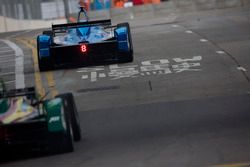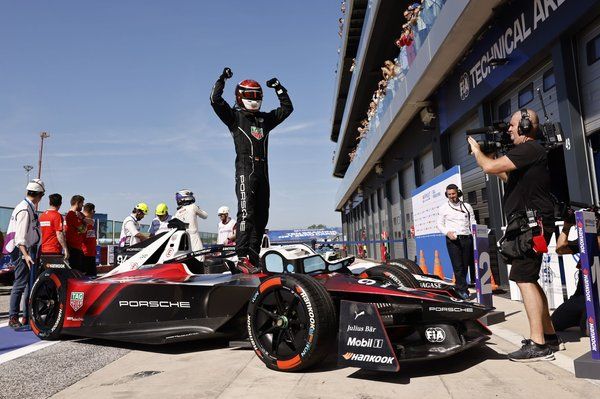Analysis: Formula E extra regen debate hots up
A number of Formula E drivers have stated that the extra regen available to the cars this season will be a major factor in determining ePrix outcomes in season three, and not everyone is happy with the situation.

Photo by: FIA Formula E















Several cars at the Hong Kong opener last month, including the top two finishers – Sebastien Buemi and Lucas di Grassi - suffered with escalating thermal temperatures in the later stages of the race.
"This year is very close on thermal limitations during the races. You cannot use the power you want or the regen you want because the ambient temperature and then the battery temperature gets too high," Di Grassi told Motorsport.com.
"There are a lot of factors involved, such as air temperature, cooling and cell behaviour. In my mind this is a scenario and one of the things that it [Formula E] shouldn't be."
Some drivers have expressed concern with the longer races, which have become a feature of the all-electric championship in seasons two and three and have seen harvesting of energy go up from 100Kw to 150Kw for the current season.
A team and driver now have to carefully balance their use of energy as the extra regen escalates thermal temperatures in the battery cells.
The Hong Kong ePrix was not one of the longest races of the season but the upcoming events are set to be slightly longer, which is likely to increase the likelihood of escalating thermal temperatures.
The ambient temperature is one of the key factors in how hot the battery becomes, particularly with the regen. The long-term weather forecast at Marrakesh indicates a maximum of 25 degrees, which should be more comfortable for those powertrains that suffered in Hong Kong, where temperatures peaked at 32 degrees.
The fact the race is scheduled to be slightly longer than the opener at Hong Kong means the cars won't run as hard and thus will have to save more energy. This tends to help the thermal situation because the battery is not being worked as hard.
"We shouldn't have battery related temperature issues because then the discrepancy between one and another car is all about how well the battery behaves," opined di Grassi. "Because they have increased the regen for this year, it is becoming more of an issue than in previous years."
Team strategy key to managing thermal temperatures
The thermal behaviours of the battery have always been a major part of the challenge from the beginning of Formula E in 2014, especially in hotter climates, and it will continue to remain one.
"You have to manage it during the race and often it can be the cause of some great finishes (or losses) - go and watch the end of the Buenos Aires race last season with Vergne going from second to sixth in the last few laps," Roger Griffiths, Andretti technical chief, told Motorsport.com.
"If we take away the thermal issues from the battery, then the challenge becomes easier. Formula E is about the development of electric vehicles and they are all going to have a battery on board so we will have to deal with the temperatures associated with them."
With the battery fixed until 2018, the physical aspects of the battery cooling (radiators, fluid, aero, etc) are specified and cannot be changed, neither can the software.
"Therefore the battery can be controlled by the teams, how they choose to use their set energy and how, when and where to use the re-gen capabilities.
"At some point we will have open battery competition and what we are learning today about how to manage temperatures will only help [in the future]," Griffiths said.
"I disagree that the differences are in the batteries. The battery temperatures are modelled mathematically. The same model is in all the batteries and this gives the fairest and most equivalent performance across the field.
"How the battery performs is down to how the team decides to use the regen; how much, when, what does the driver do to compensate. If your powertrain package is inefficient, then not only will you use more energy, you will also create more heat in the battery at the same time.
"I am sure the additional regen is going to play a part in the outcome of the races to some extent but the good teams should be able to deal with it and the others not," concluded Griffiths.
Since season one, some teams have run a specific battery temperature modelling/predictive spreadsheet that updates each lap to give visibility on maximum RESS temperature during the race based on all the temperature data the teams can get their hands on.
The Williams Advanced Engineering designed and built battery has a temperature limit that triggers power restriction settings when the temperature gets too high.
Season four of the FIA Formula E Championship, which is due to start next autumn, will see maximum power release of 220kW in qualifying and 180kW in the race. The power regen allowed will again go up to 200kW, double what it was in season two.
Be part of Motorsport community
Join the conversationShare Or Save This Story
Subscribe and access Motorsport.com with your ad-blocker.
From Formula 1 to MotoGP we report straight from the paddock because we love our sport, just like you. In order to keep delivering our expert journalism, our website uses advertising. Still, we want to give you the opportunity to enjoy an ad-free and tracker-free website and to continue using your adblocker.















Top Comments